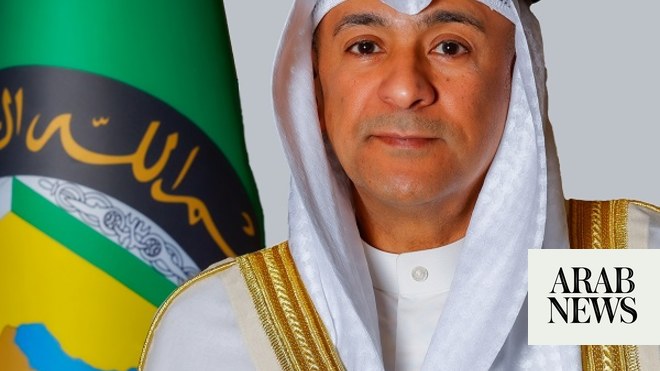
Gulf Cooperation Council (GCC) Secretary-General Nayef Al-Hajraf arrived in Baghdad on Monday for talks with Iraqi officials on various issues.
He met with President Barham Salih, Prime Minister Mustafa al-Kadhimi and Foreign Minister Fuad Hussein to discuss bolstering relations in all fields.
A statement from the presidency said discussions tackled bilateral relations between Iraq and the GCC. The officials underscored the importance of bolstering them to serve the interests of their peoples and boost peace.
They also hailed progress achieved in the agreements signed between Baghdad and Gulf countries, ranging from economy and investment.
Salih praised the success of the latest Gulf summit that was hosted by Saudi Arabia’s AlUla and which mended the Gulf rift. The reconciliation will help “boost the GCC, its vital role and positive impact on the security and stability of the region.”
The Iraqi leader noted the challenges in the region, especially terrorism and economic hardships, urging joint cooperation to confront them.
“A secure sovereign Iraq with solid relations with its Arab and Islamic surroundings will serve as the foundation for bolstering security, stability and development in the region,” he stressed.
Hajraf, for his part, underscored the GCC’s commitment to supporting the security, safety and sovereignty of Iraq and backing it in its fight against terrorism.
After receiving the GCC chief, Kadhimi said Iraq was keen on strengthening relations with the Gulf countries.
In a statement, he underlined the need to achieve cooperation in various political, cultural, economic and business ties, “especially since it has yet to rise to Iraq’s expectations.”
To that end, he urged the need to speed up efforts to set up the electrical network between Iraq and the Gulf, as well as boost trade.
In 2019, Iraq had signed a deal with the GCC to build a power line that would import 500 megawatts of electricity.
“The GCC is keen on strengthening relations with Iraq. The Gulf states support Iraq in its war against terrorism,” Hajraf said following talks with the Iraqi FM. “The stability of Iraq has positive implications for the security of the region.”
Dhafer al-Ani, a member of parliaments foreign affairs committee, told Asharq Al-Awsat that Hajraf’s visit took place soon after the Gulf reconciliation. The row, he noted, was exploited by regional countries to expand their negative influence in Iraq.
He blamed this influence for obstructing several Gulf-Iraqi cooperation projects.
Hajraf’s visit reflects a “new united Gulf approach” towards Iraq, which is largely focused on its Arab identity and seeking joint interests.
Hajraf is aiming to assess Iraqi stances from regional issues, specifically Iran’s malign and hostile meddling in the region, he went on to say. The GCC is assessing “how far Iraq is ready to take independent decisions away from Tehran’s hegemony.”
“Wider cooperation with the Gulf hinges on the Iraqi political system’s ability to demonstrate that it is not aligning itself with Iranian policies,” al-Ani explained.
In remarks to Asharq Al-Awsat, Dr. Ihssan Shmary, head of the Center for Political Thinking in Iraq, said Hajraf’s visit was driven by the united Gulf stance to support relations with Iraq on all levels.
Another reason is the arrival of Joe Biden to the White House and the Gulf need to coordinate regional positions with Baghdad, he added.
Furthermore, Hajraf is seeking to convey the support of Gulf countries to Iraq’s current approach, which they believe is heading on the “right path.”








